Federation Business School: Business Law Assignment - Semester 1, 2019
VerifiedAdded on 2022/11/23
|9
|1714
|333
Homework Assignment
AI Summary
This Business Law assignment solution addresses a contract law case study involving the sale of a van, analyzing issues of offer, acceptance, consideration, and capacity. It determines the buyer's claim against the seller, considering potential defenses and remedies, including specific performance. The assignment also explores property law concepts, defining chattel mortgages, perfection, fixtures, the Torrens system, and leaseholds. The solution references relevant case law and statutory sources to support its arguments. The assignment covers the key elements of contract formation, breach of contract, and remedies available to the parties, with a focus on the legal rights and obligations of buyers and sellers. The document provides a comprehensive understanding of legal principles in business law. The assignment is based on the Federation Business School BULAW 1502 Fundamentals of Law course, Semester 1, 2019.
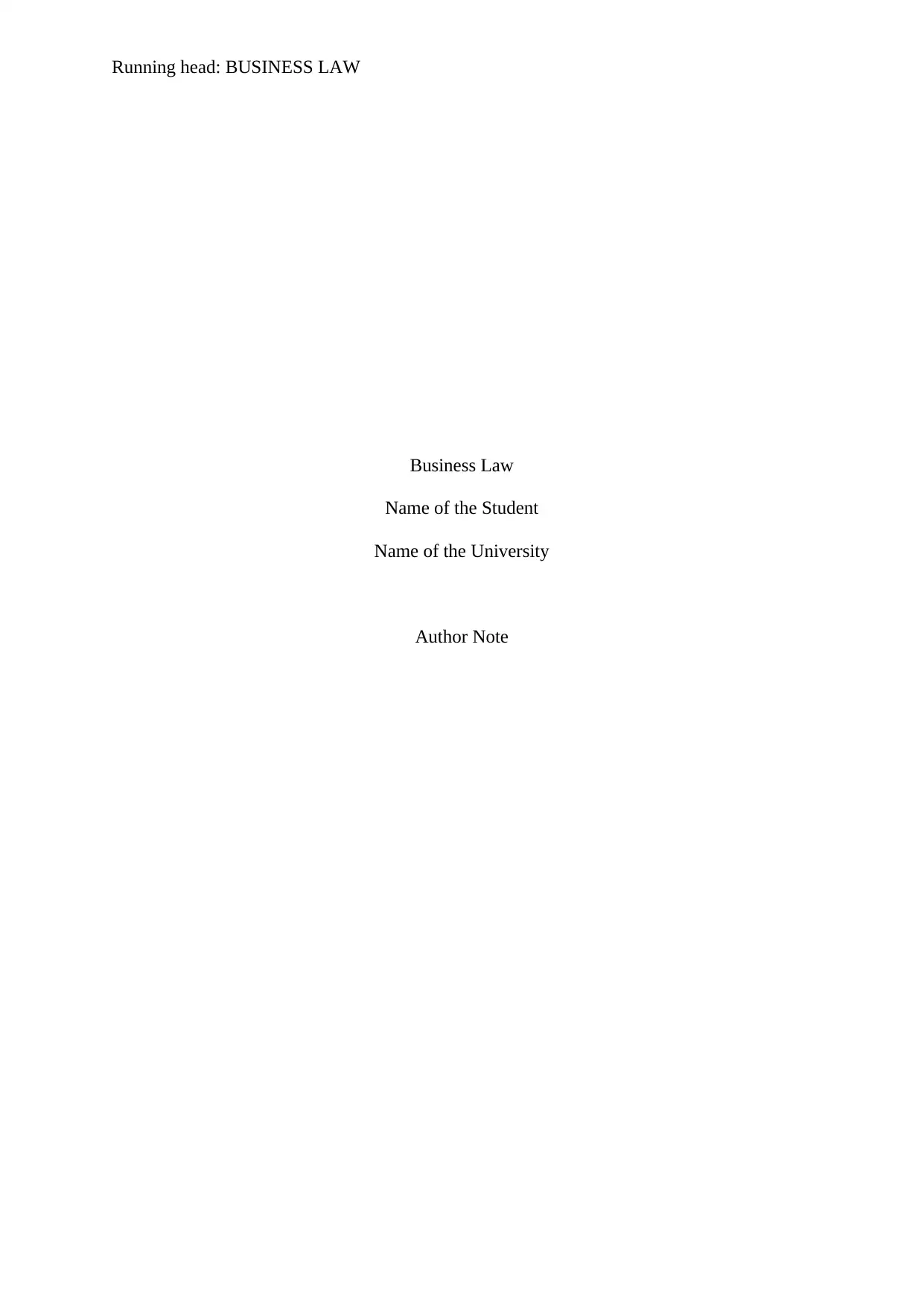
Running head: BUSINESS LAW
Business Law
Name of the Student
Name of the University
Author Note
Business Law
Name of the Student
Name of the University
Author Note
Paraphrase This Document
Need a fresh take? Get an instant paraphrase of this document with our AI Paraphraser
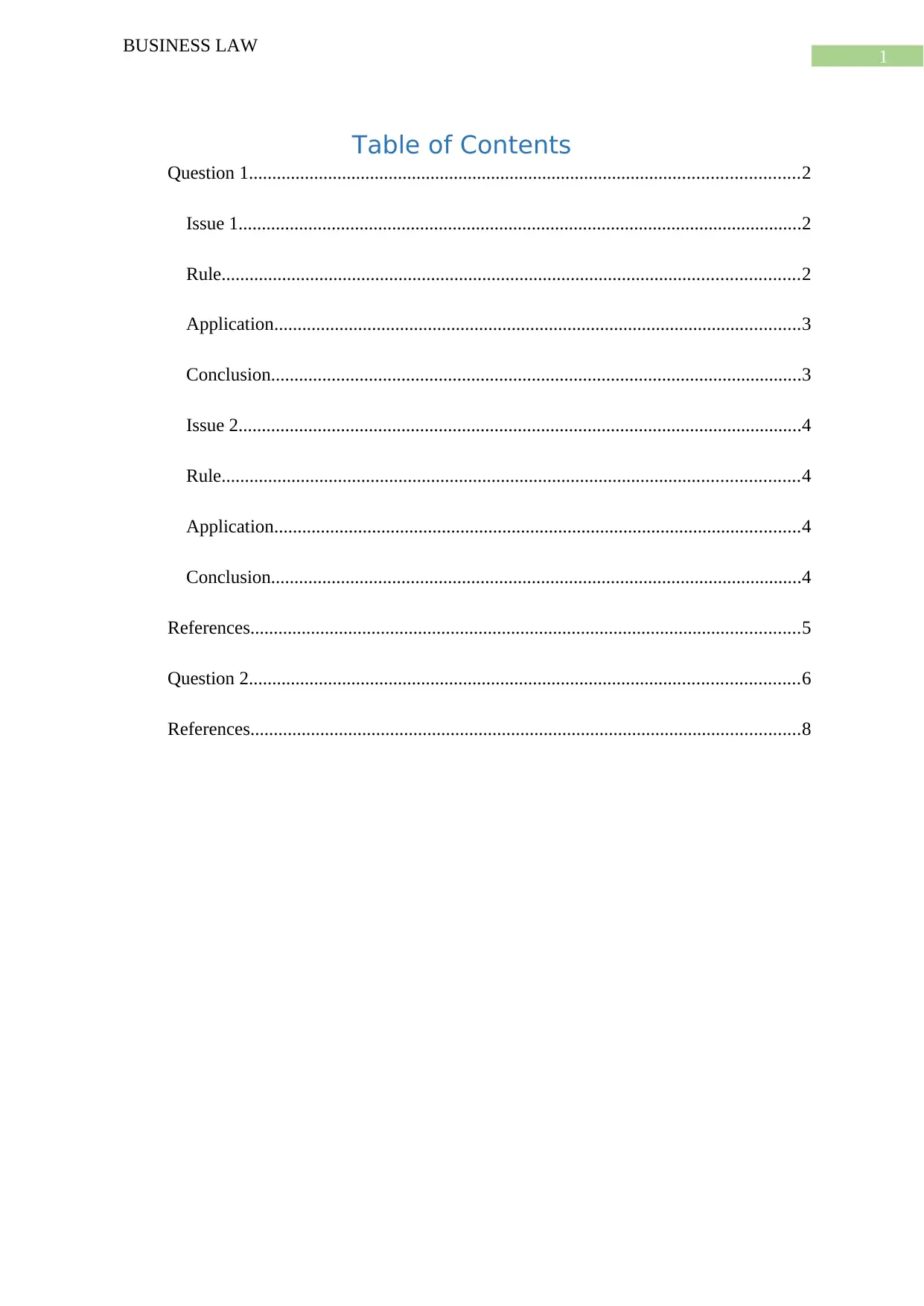
1
BUSINESS LAW
Table of Contents
Question 1......................................................................................................................2
Issue 1.........................................................................................................................2
Rule............................................................................................................................2
Application.................................................................................................................3
Conclusion..................................................................................................................3
Issue 2.........................................................................................................................4
Rule............................................................................................................................4
Application.................................................................................................................4
Conclusion..................................................................................................................4
References......................................................................................................................5
Question 2......................................................................................................................6
References......................................................................................................................8
BUSINESS LAW
Table of Contents
Question 1......................................................................................................................2
Issue 1.........................................................................................................................2
Rule............................................................................................................................2
Application.................................................................................................................3
Conclusion..................................................................................................................3
Issue 2.........................................................................................................................4
Rule............................................................................................................................4
Application.................................................................................................................4
Conclusion..................................................................................................................4
References......................................................................................................................5
Question 2......................................................................................................................6
References......................................................................................................................8
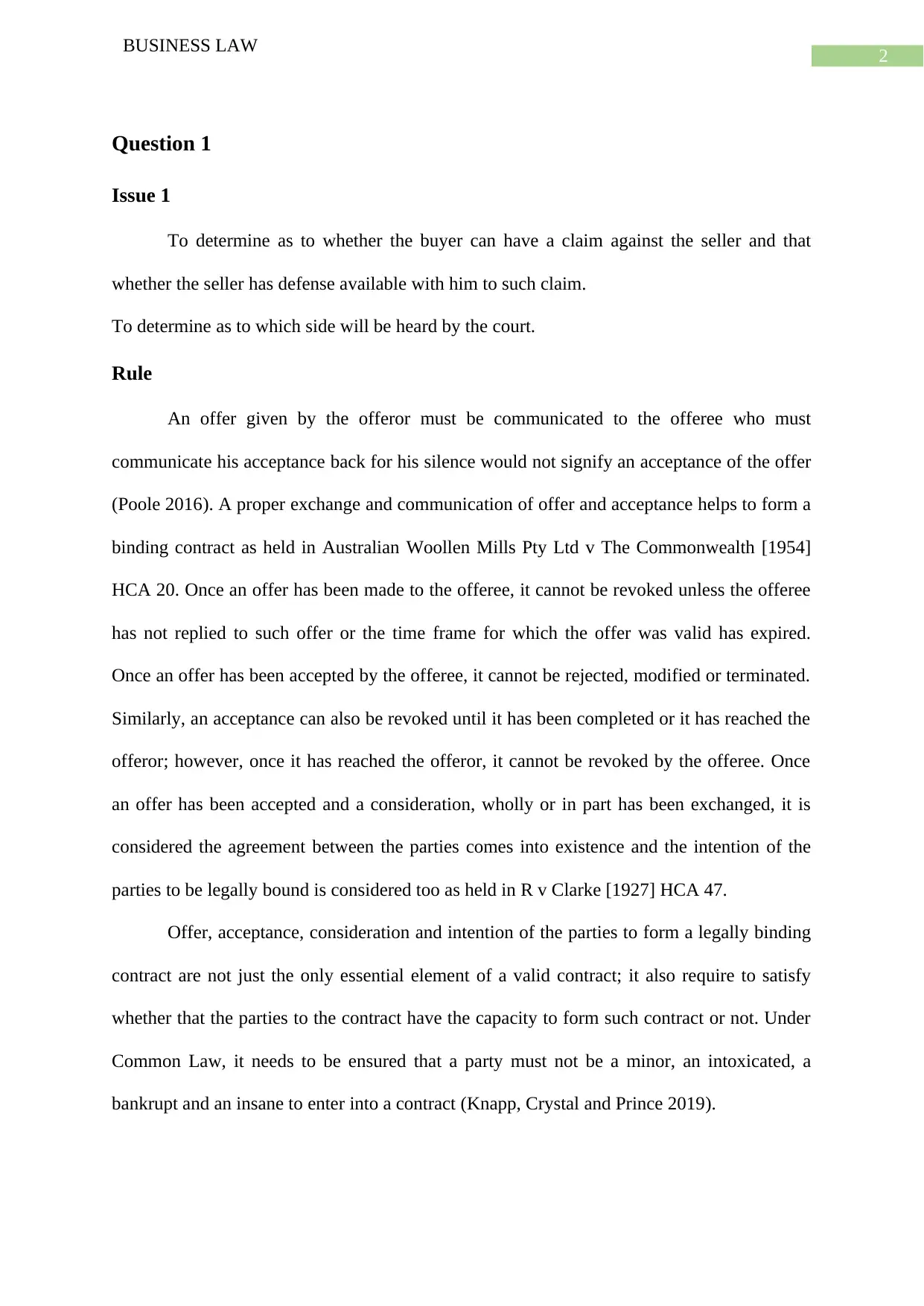
2
BUSINESS LAW
Question 1
Issue 1
To determine as to whether the buyer can have a claim against the seller and that
whether the seller has defense available with him to such claim.
To determine as to which side will be heard by the court.
Rule
An offer given by the offeror must be communicated to the offeree who must
communicate his acceptance back for his silence would not signify an acceptance of the offer
(Poole 2016). A proper exchange and communication of offer and acceptance helps to form a
binding contract as held in Australian Woollen Mills Pty Ltd v The Commonwealth [1954]
HCA 20. Once an offer has been made to the offeree, it cannot be revoked unless the offeree
has not replied to such offer or the time frame for which the offer was valid has expired.
Once an offer has been accepted by the offeree, it cannot be rejected, modified or terminated.
Similarly, an acceptance can also be revoked until it has been completed or it has reached the
offeror; however, once it has reached the offeror, it cannot be revoked by the offeree. Once
an offer has been accepted and a consideration, wholly or in part has been exchanged, it is
considered the agreement between the parties comes into existence and the intention of the
parties to be legally bound is considered too as held in R v Clarke [1927] HCA 47.
Offer, acceptance, consideration and intention of the parties to form a legally binding
contract are not just the only essential element of a valid contract; it also require to satisfy
whether that the parties to the contract have the capacity to form such contract or not. Under
Common Law, it needs to be ensured that a party must not be a minor, an intoxicated, a
bankrupt and an insane to enter into a contract (Knapp, Crystal and Prince 2019).
BUSINESS LAW
Question 1
Issue 1
To determine as to whether the buyer can have a claim against the seller and that
whether the seller has defense available with him to such claim.
To determine as to which side will be heard by the court.
Rule
An offer given by the offeror must be communicated to the offeree who must
communicate his acceptance back for his silence would not signify an acceptance of the offer
(Poole 2016). A proper exchange and communication of offer and acceptance helps to form a
binding contract as held in Australian Woollen Mills Pty Ltd v The Commonwealth [1954]
HCA 20. Once an offer has been made to the offeree, it cannot be revoked unless the offeree
has not replied to such offer or the time frame for which the offer was valid has expired.
Once an offer has been accepted by the offeree, it cannot be rejected, modified or terminated.
Similarly, an acceptance can also be revoked until it has been completed or it has reached the
offeror; however, once it has reached the offeror, it cannot be revoked by the offeree. Once
an offer has been accepted and a consideration, wholly or in part has been exchanged, it is
considered the agreement between the parties comes into existence and the intention of the
parties to be legally bound is considered too as held in R v Clarke [1927] HCA 47.
Offer, acceptance, consideration and intention of the parties to form a legally binding
contract are not just the only essential element of a valid contract; it also require to satisfy
whether that the parties to the contract have the capacity to form such contract or not. Under
Common Law, it needs to be ensured that a party must not be a minor, an intoxicated, a
bankrupt and an insane to enter into a contract (Knapp, Crystal and Prince 2019).
⊘ This is a preview!⊘
Do you want full access?
Subscribe today to unlock all pages.

Trusted by 1+ million students worldwide
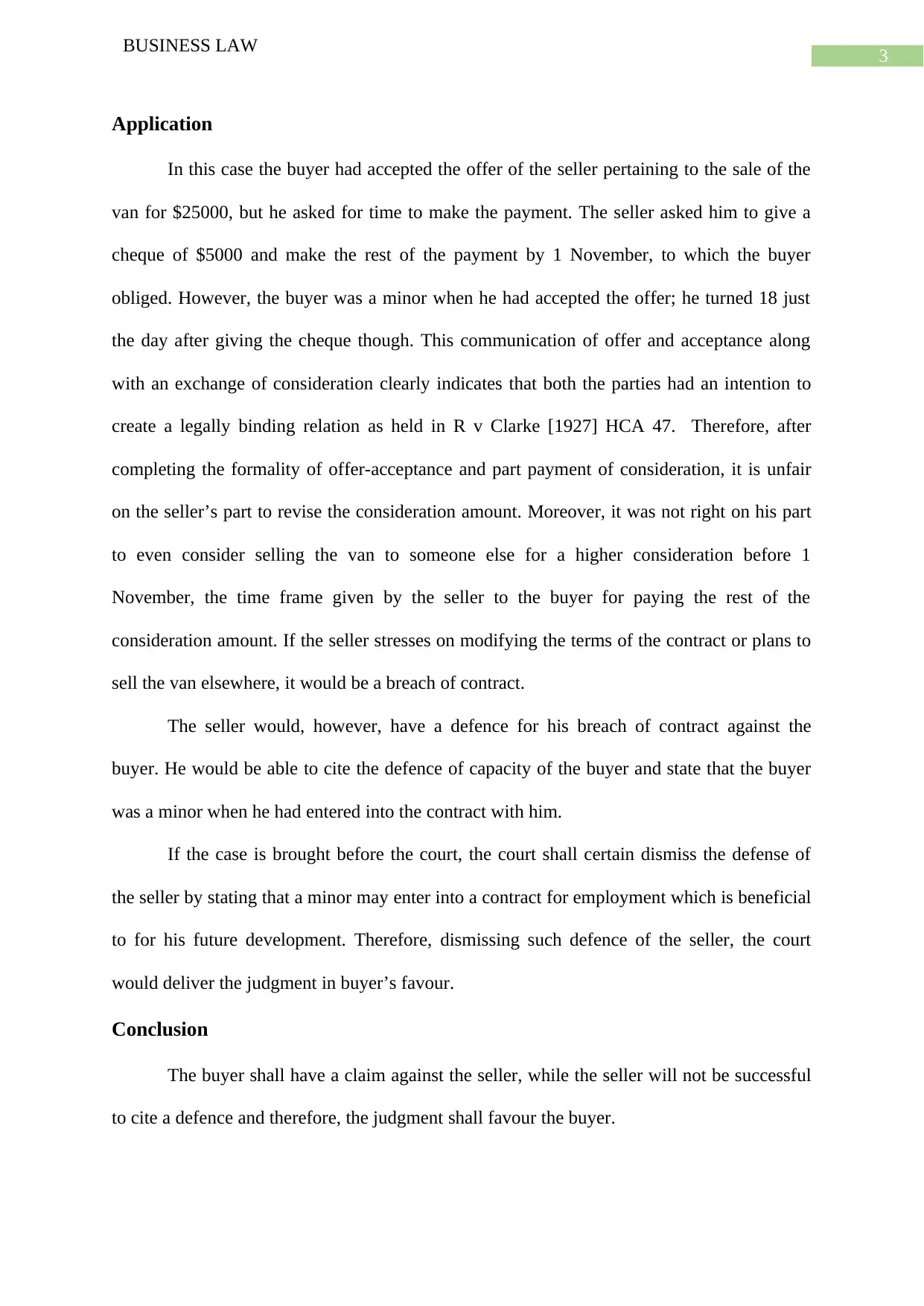
3
BUSINESS LAW
Application
In this case the buyer had accepted the offer of the seller pertaining to the sale of the
van for $25000, but he asked for time to make the payment. The seller asked him to give a
cheque of $5000 and make the rest of the payment by 1 November, to which the buyer
obliged. However, the buyer was a minor when he had accepted the offer; he turned 18 just
the day after giving the cheque though. This communication of offer and acceptance along
with an exchange of consideration clearly indicates that both the parties had an intention to
create a legally binding relation as held in R v Clarke [1927] HCA 47. Therefore, after
completing the formality of offer-acceptance and part payment of consideration, it is unfair
on the seller’s part to revise the consideration amount. Moreover, it was not right on his part
to even consider selling the van to someone else for a higher consideration before 1
November, the time frame given by the seller to the buyer for paying the rest of the
consideration amount. If the seller stresses on modifying the terms of the contract or plans to
sell the van elsewhere, it would be a breach of contract.
The seller would, however, have a defence for his breach of contract against the
buyer. He would be able to cite the defence of capacity of the buyer and state that the buyer
was a minor when he had entered into the contract with him.
If the case is brought before the court, the court shall certain dismiss the defense of
the seller by stating that a minor may enter into a contract for employment which is beneficial
to for his future development. Therefore, dismissing such defence of the seller, the court
would deliver the judgment in buyer’s favour.
Conclusion
The buyer shall have a claim against the seller, while the seller will not be successful
to cite a defence and therefore, the judgment shall favour the buyer.
BUSINESS LAW
Application
In this case the buyer had accepted the offer of the seller pertaining to the sale of the
van for $25000, but he asked for time to make the payment. The seller asked him to give a
cheque of $5000 and make the rest of the payment by 1 November, to which the buyer
obliged. However, the buyer was a minor when he had accepted the offer; he turned 18 just
the day after giving the cheque though. This communication of offer and acceptance along
with an exchange of consideration clearly indicates that both the parties had an intention to
create a legally binding relation as held in R v Clarke [1927] HCA 47. Therefore, after
completing the formality of offer-acceptance and part payment of consideration, it is unfair
on the seller’s part to revise the consideration amount. Moreover, it was not right on his part
to even consider selling the van to someone else for a higher consideration before 1
November, the time frame given by the seller to the buyer for paying the rest of the
consideration amount. If the seller stresses on modifying the terms of the contract or plans to
sell the van elsewhere, it would be a breach of contract.
The seller would, however, have a defence for his breach of contract against the
buyer. He would be able to cite the defence of capacity of the buyer and state that the buyer
was a minor when he had entered into the contract with him.
If the case is brought before the court, the court shall certain dismiss the defense of
the seller by stating that a minor may enter into a contract for employment which is beneficial
to for his future development. Therefore, dismissing such defence of the seller, the court
would deliver the judgment in buyer’s favour.
Conclusion
The buyer shall have a claim against the seller, while the seller will not be successful
to cite a defence and therefore, the judgment shall favour the buyer.
Paraphrase This Document
Need a fresh take? Get an instant paraphrase of this document with our AI Paraphraser
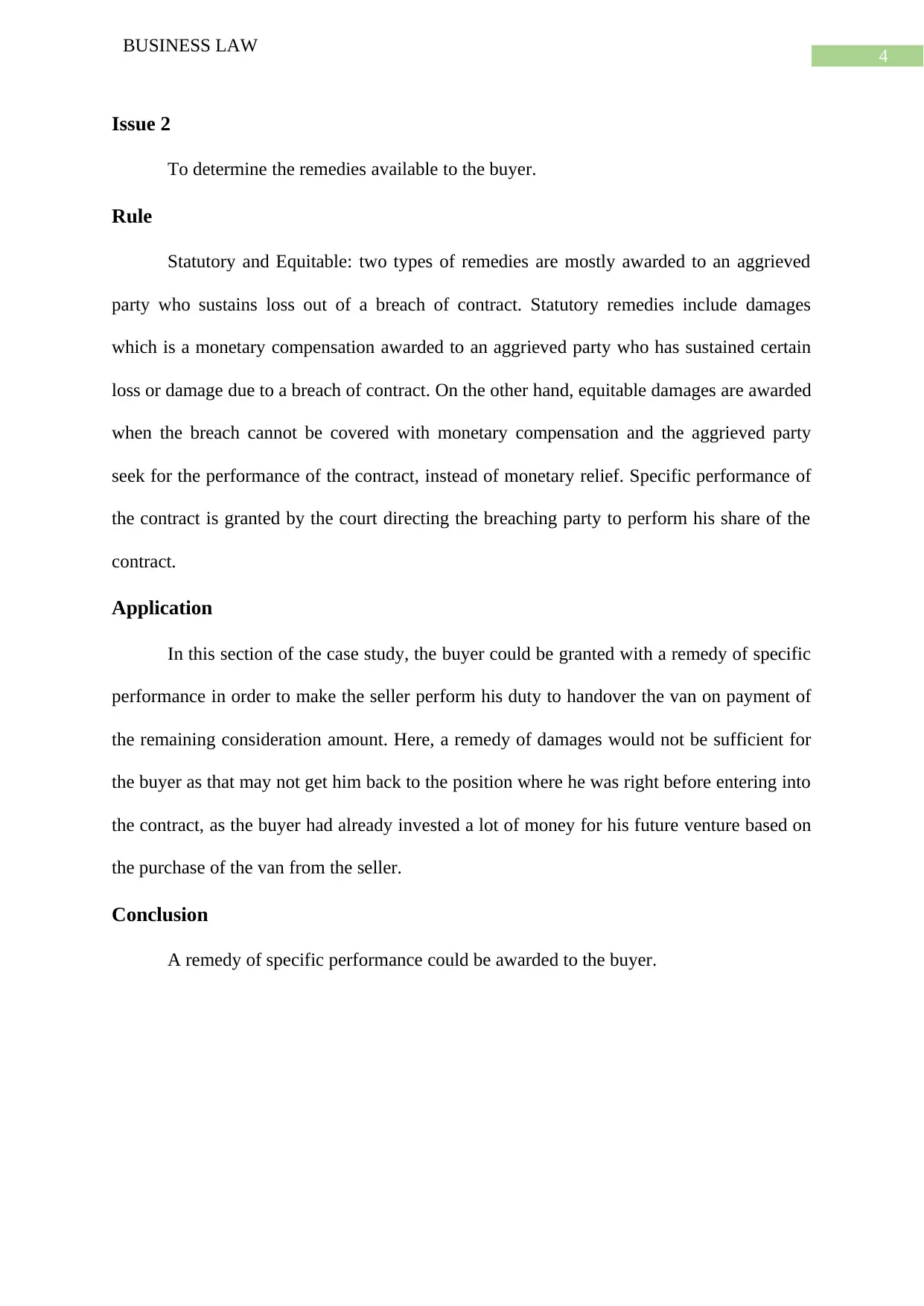
4
BUSINESS LAW
Issue 2
To determine the remedies available to the buyer.
Rule
Statutory and Equitable: two types of remedies are mostly awarded to an aggrieved
party who sustains loss out of a breach of contract. Statutory remedies include damages
which is a monetary compensation awarded to an aggrieved party who has sustained certain
loss or damage due to a breach of contract. On the other hand, equitable damages are awarded
when the breach cannot be covered with monetary compensation and the aggrieved party
seek for the performance of the contract, instead of monetary relief. Specific performance of
the contract is granted by the court directing the breaching party to perform his share of the
contract.
Application
In this section of the case study, the buyer could be granted with a remedy of specific
performance in order to make the seller perform his duty to handover the van on payment of
the remaining consideration amount. Here, a remedy of damages would not be sufficient for
the buyer as that may not get him back to the position where he was right before entering into
the contract, as the buyer had already invested a lot of money for his future venture based on
the purchase of the van from the seller.
Conclusion
A remedy of specific performance could be awarded to the buyer.
BUSINESS LAW
Issue 2
To determine the remedies available to the buyer.
Rule
Statutory and Equitable: two types of remedies are mostly awarded to an aggrieved
party who sustains loss out of a breach of contract. Statutory remedies include damages
which is a monetary compensation awarded to an aggrieved party who has sustained certain
loss or damage due to a breach of contract. On the other hand, equitable damages are awarded
when the breach cannot be covered with monetary compensation and the aggrieved party
seek for the performance of the contract, instead of monetary relief. Specific performance of
the contract is granted by the court directing the breaching party to perform his share of the
contract.
Application
In this section of the case study, the buyer could be granted with a remedy of specific
performance in order to make the seller perform his duty to handover the van on payment of
the remaining consideration amount. Here, a remedy of damages would not be sufficient for
the buyer as that may not get him back to the position where he was right before entering into
the contract, as the buyer had already invested a lot of money for his future venture based on
the purchase of the van from the seller.
Conclusion
A remedy of specific performance could be awarded to the buyer.
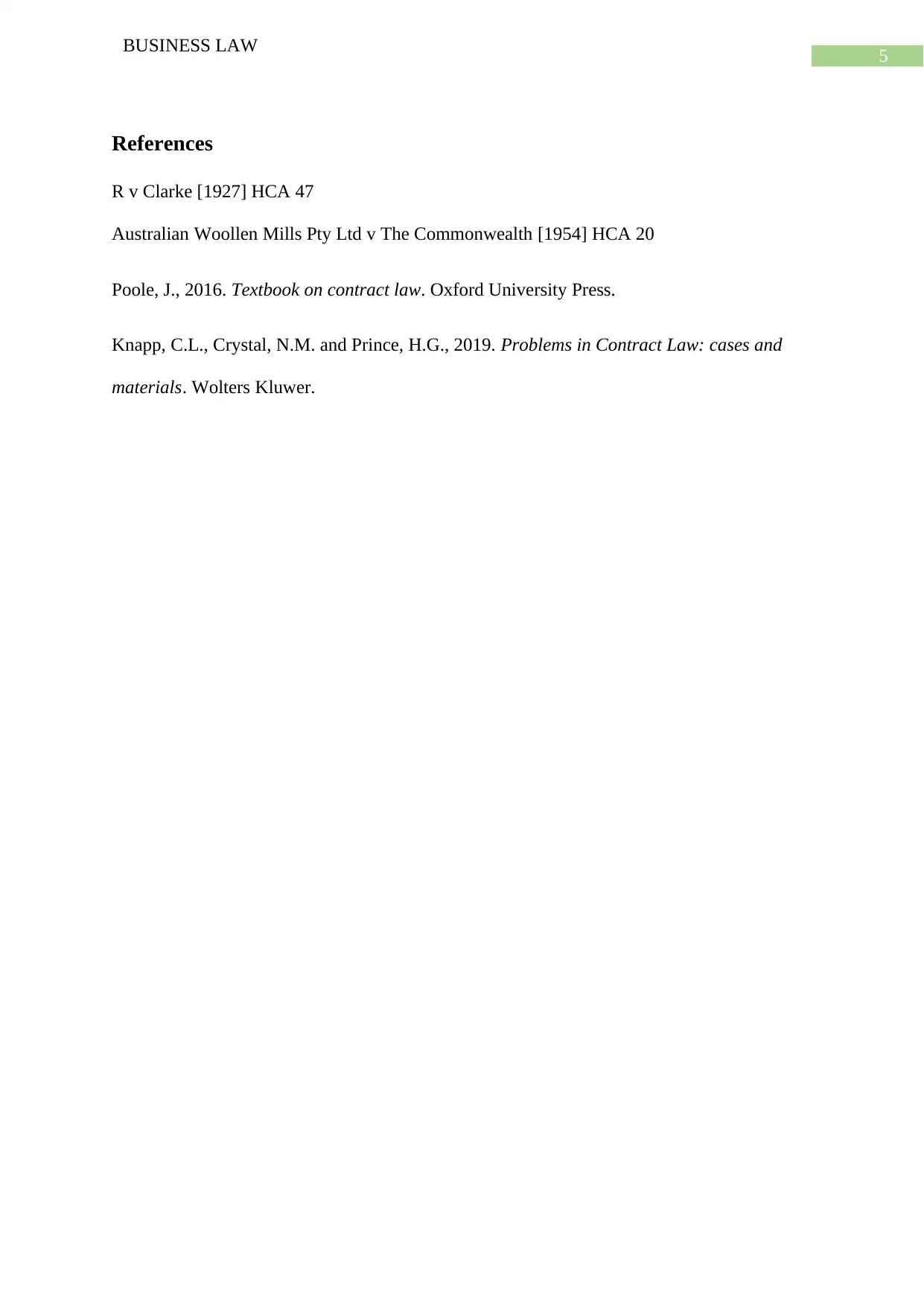
5
BUSINESS LAW
References
R v Clarke [1927] HCA 47
Australian Woollen Mills Pty Ltd v The Commonwealth [1954] HCA 20
Poole, J., 2016. Textbook on contract law. Oxford University Press.
Knapp, C.L., Crystal, N.M. and Prince, H.G., 2019. Problems in Contract Law: cases and
materials. Wolters Kluwer.
BUSINESS LAW
References
R v Clarke [1927] HCA 47
Australian Woollen Mills Pty Ltd v The Commonwealth [1954] HCA 20
Poole, J., 2016. Textbook on contract law. Oxford University Press.
Knapp, C.L., Crystal, N.M. and Prince, H.G., 2019. Problems in Contract Law: cases and
materials. Wolters Kluwer.
⊘ This is a preview!⊘
Do you want full access?
Subscribe today to unlock all pages.

Trusted by 1+ million students worldwide
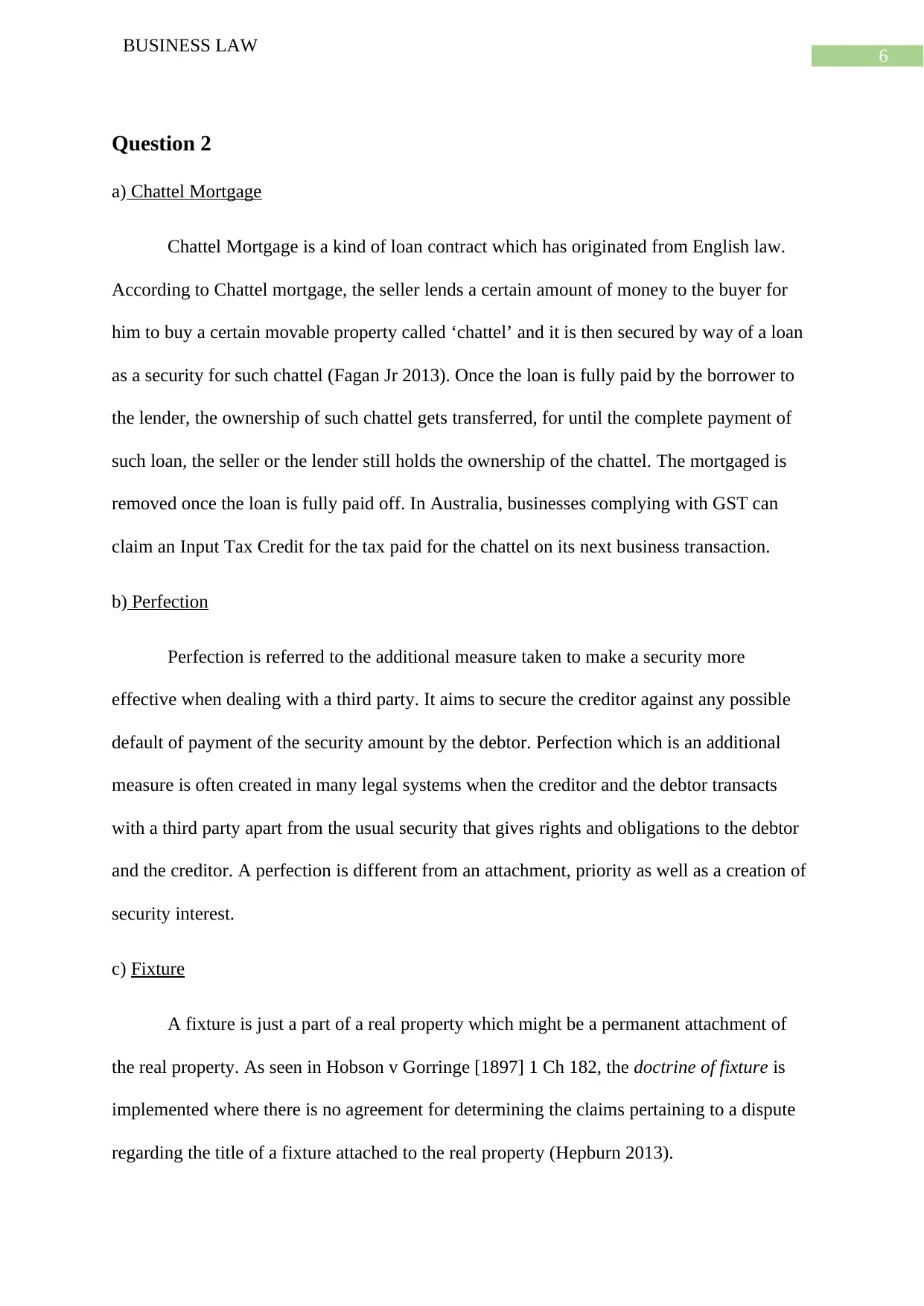
6
BUSINESS LAW
Question 2
a) Chattel Mortgage
Chattel Mortgage is a kind of loan contract which has originated from English law.
According to Chattel mortgage, the seller lends a certain amount of money to the buyer for
him to buy a certain movable property called ‘chattel’ and it is then secured by way of a loan
as a security for such chattel (Fagan Jr 2013). Once the loan is fully paid by the borrower to
the lender, the ownership of such chattel gets transferred, for until the complete payment of
such loan, the seller or the lender still holds the ownership of the chattel. The mortgaged is
removed once the loan is fully paid off. In Australia, businesses complying with GST can
claim an Input Tax Credit for the tax paid for the chattel on its next business transaction.
b) Perfection
Perfection is referred to the additional measure taken to make a security more
effective when dealing with a third party. It aims to secure the creditor against any possible
default of payment of the security amount by the debtor. Perfection which is an additional
measure is often created in many legal systems when the creditor and the debtor transacts
with a third party apart from the usual security that gives rights and obligations to the debtor
and the creditor. A perfection is different from an attachment, priority as well as a creation of
security interest.
c) Fixture
A fixture is just a part of a real property which might be a permanent attachment of
the real property. As seen in Hobson v Gorringe [1897] 1 Ch 182, the doctrine of fixture is
implemented where there is no agreement for determining the claims pertaining to a dispute
regarding the title of a fixture attached to the real property (Hepburn 2013).
BUSINESS LAW
Question 2
a) Chattel Mortgage
Chattel Mortgage is a kind of loan contract which has originated from English law.
According to Chattel mortgage, the seller lends a certain amount of money to the buyer for
him to buy a certain movable property called ‘chattel’ and it is then secured by way of a loan
as a security for such chattel (Fagan Jr 2013). Once the loan is fully paid by the borrower to
the lender, the ownership of such chattel gets transferred, for until the complete payment of
such loan, the seller or the lender still holds the ownership of the chattel. The mortgaged is
removed once the loan is fully paid off. In Australia, businesses complying with GST can
claim an Input Tax Credit for the tax paid for the chattel on its next business transaction.
b) Perfection
Perfection is referred to the additional measure taken to make a security more
effective when dealing with a third party. It aims to secure the creditor against any possible
default of payment of the security amount by the debtor. Perfection which is an additional
measure is often created in many legal systems when the creditor and the debtor transacts
with a third party apart from the usual security that gives rights and obligations to the debtor
and the creditor. A perfection is different from an attachment, priority as well as a creation of
security interest.
c) Fixture
A fixture is just a part of a real property which might be a permanent attachment of
the real property. As seen in Hobson v Gorringe [1897] 1 Ch 182, the doctrine of fixture is
implemented where there is no agreement for determining the claims pertaining to a dispute
regarding the title of a fixture attached to the real property (Hepburn 2013).
Paraphrase This Document
Need a fresh take? Get an instant paraphrase of this document with our AI Paraphraser
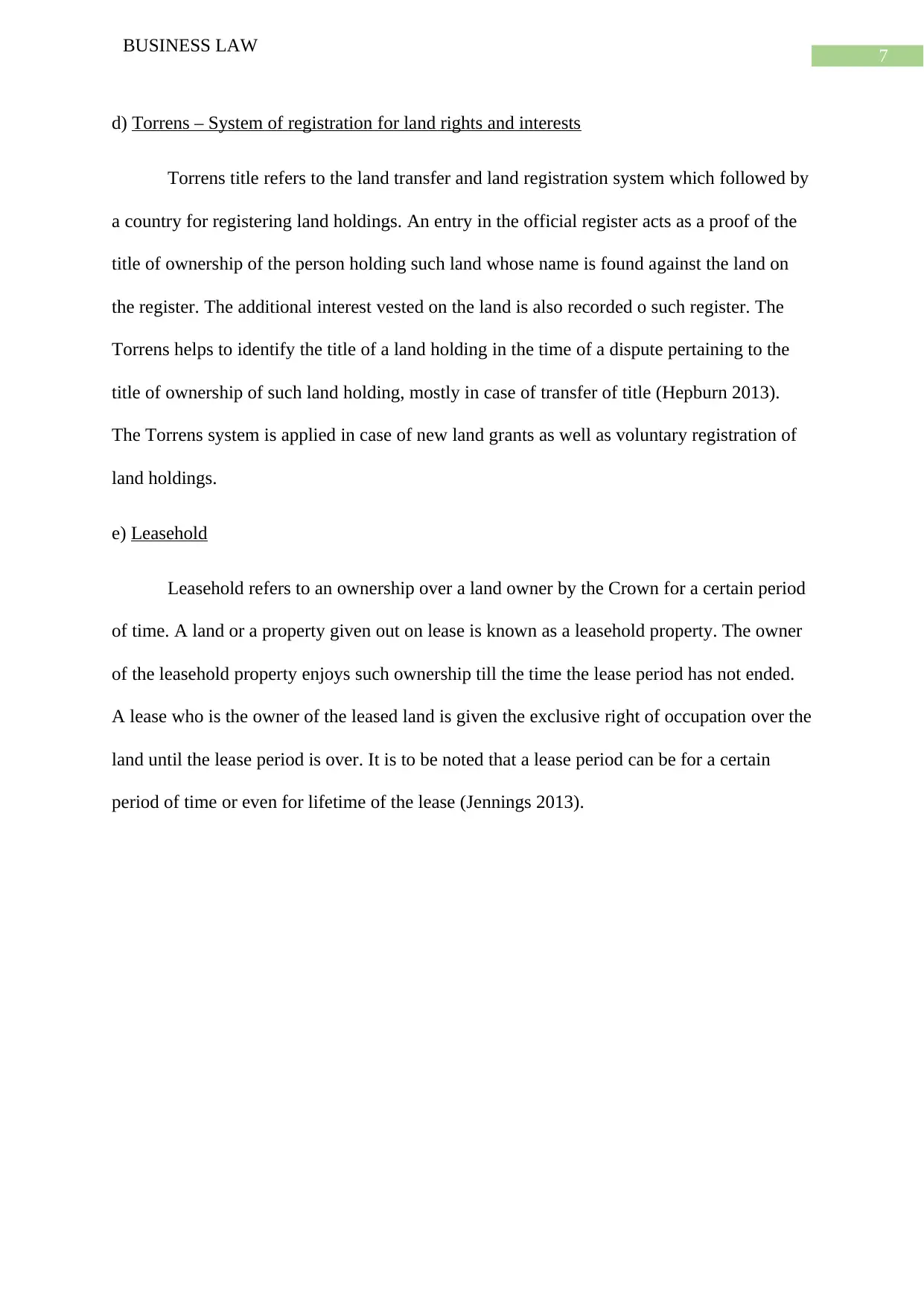
7
BUSINESS LAW
d) Torrens – System of registration for land rights and interests
Torrens title refers to the land transfer and land registration system which followed by
a country for registering land holdings. An entry in the official register acts as a proof of the
title of ownership of the person holding such land whose name is found against the land on
the register. The additional interest vested on the land is also recorded o such register. The
Torrens helps to identify the title of a land holding in the time of a dispute pertaining to the
title of ownership of such land holding, mostly in case of transfer of title (Hepburn 2013).
The Torrens system is applied in case of new land grants as well as voluntary registration of
land holdings.
e) Leasehold
Leasehold refers to an ownership over a land owner by the Crown for a certain period
of time. A land or a property given out on lease is known as a leasehold property. The owner
of the leasehold property enjoys such ownership till the time the lease period has not ended.
A lease who is the owner of the leased land is given the exclusive right of occupation over the
land until the lease period is over. It is to be noted that a lease period can be for a certain
period of time or even for lifetime of the lease (Jennings 2013).
BUSINESS LAW
d) Torrens – System of registration for land rights and interests
Torrens title refers to the land transfer and land registration system which followed by
a country for registering land holdings. An entry in the official register acts as a proof of the
title of ownership of the person holding such land whose name is found against the land on
the register. The additional interest vested on the land is also recorded o such register. The
Torrens helps to identify the title of a land holding in the time of a dispute pertaining to the
title of ownership of such land holding, mostly in case of transfer of title (Hepburn 2013).
The Torrens system is applied in case of new land grants as well as voluntary registration of
land holdings.
e) Leasehold
Leasehold refers to an ownership over a land owner by the Crown for a certain period
of time. A land or a property given out on lease is known as a leasehold property. The owner
of the leasehold property enjoys such ownership till the time the lease period has not ended.
A lease who is the owner of the leased land is given the exclusive right of occupation over the
land until the lease period is over. It is to be noted that a lease period can be for a certain
period of time or even for lifetime of the lease (Jennings 2013).

8
BUSINESS LAW
References
Fagan Jr, E.T., 2013. Sales and Security Law. St. John's Law Review, 26(1), p.4.
Hepburn, S., 2013. Australian Principles of Property Law. Routledge-Cavendish.
Hobson v Gorringe [1897] 1 Ch 182
Jennings, M.M., 2013. Real estate law. Cengage Learning.
BUSINESS LAW
References
Fagan Jr, E.T., 2013. Sales and Security Law. St. John's Law Review, 26(1), p.4.
Hepburn, S., 2013. Australian Principles of Property Law. Routledge-Cavendish.
Hobson v Gorringe [1897] 1 Ch 182
Jennings, M.M., 2013. Real estate law. Cengage Learning.
⊘ This is a preview!⊘
Do you want full access?
Subscribe today to unlock all pages.

Trusted by 1+ million students worldwide
1 out of 9
Related Documents
Your All-in-One AI-Powered Toolkit for Academic Success.
+13062052269
info@desklib.com
Available 24*7 on WhatsApp / Email
![[object Object]](/_next/static/media/star-bottom.7253800d.svg)
Unlock your academic potential
Copyright © 2020–2026 A2Z Services. All Rights Reserved. Developed and managed by ZUCOL.





